Iranians had promised “severe revenge” for the assassination of their top general Qassem Soleimani, and on Tuesday night they delivered. Missiles were launched from Iranian soil into a large airbase in Iraq where hundreds of American forces are stationed alongside others.
But the high profile attack seemed to have been planned in a way to leave no casualties and rather serve as a warning that although Iran is not able to attack US soil, they have the will and capability to attack US bases in other countries across the region.
The retaliation seemed to be calculated in a way to avoid further escalation and offer an exit ramp for Donald Trump out of this episode. And the American president took it.
Download the new Independent Premium app
Sharing the full story, not just the headlines
“Iranians are used to IRGC commanders being killed in battle every year,” said Hamzeh Ghalebi, an Iranian political analyst living in France. “But Soleimani’s assassination outraged Iranians because of the way it was done, so publicly and with such humiliation, followed by Trump’s reaction that basically meant we can do whatever we want and if you respond we will attack you.”
Mr Ghalebi told The Independent Iran “had to take this step for its survival”. “Iranians needed to retaliate militarily because if they didn’t, the balance of power in Washington would shift towards those who argue that attacking Iran has no cost. So they had to raise the cost to avoid a war.”
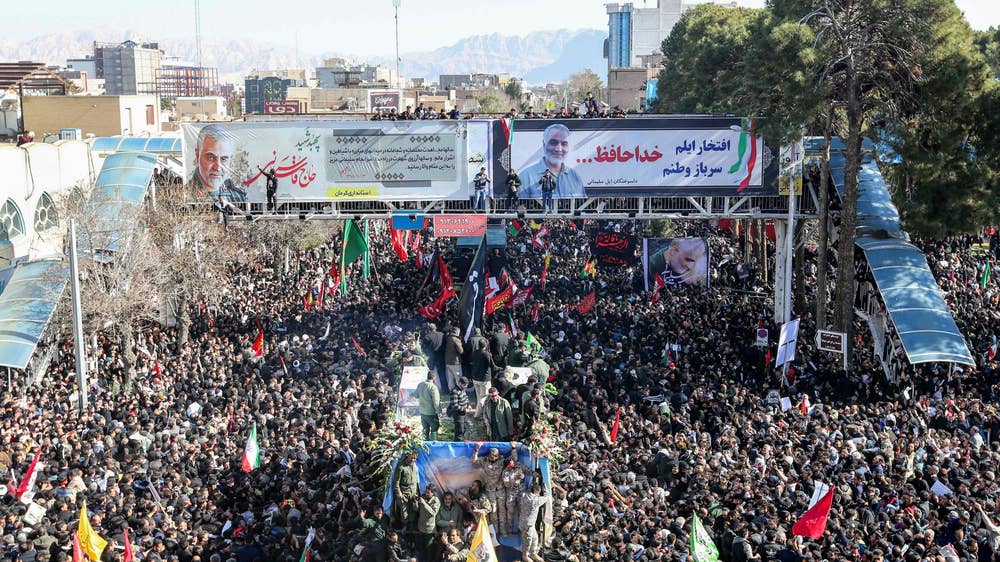
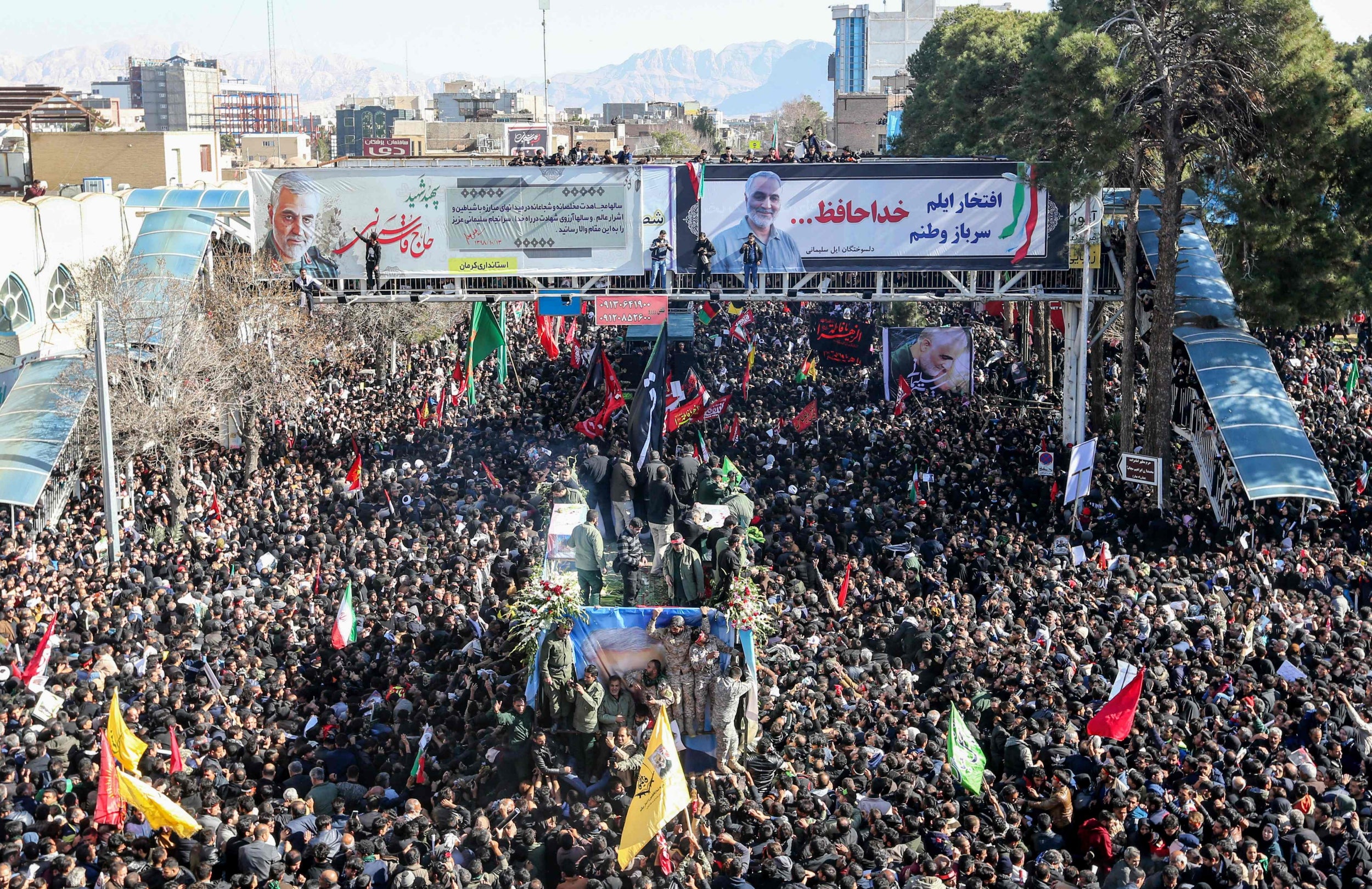
1/24 Kerman – Final stage of funeral processions
Iranian mourners gather around a vehicle carrying the coffin of top general Qasem Soleimani during the final stage of funeral processions, in his hometown Kerman. Soleimani was killed outside Baghdad airport in a drone strike ordered by US President Donald Trump, ratcheting up tensions with Iran which has vowed “severe revenge”
AFP via Getty Images
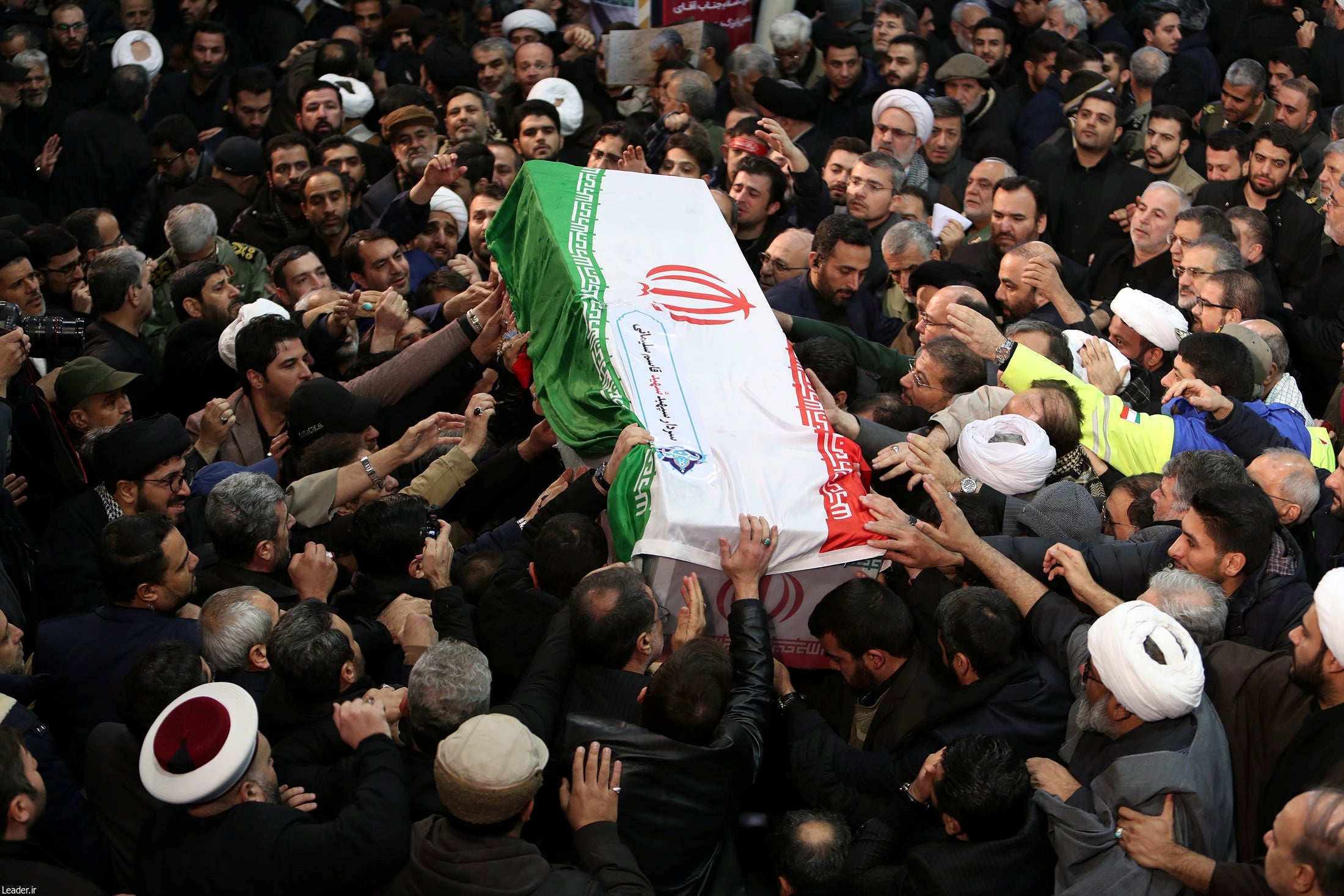
2/24 Tehran
Iranian people carry a coffin of Iranian Major-General Qassem Soleimani during a funeral procession in Tehran
Official Khamenei website via Reuters
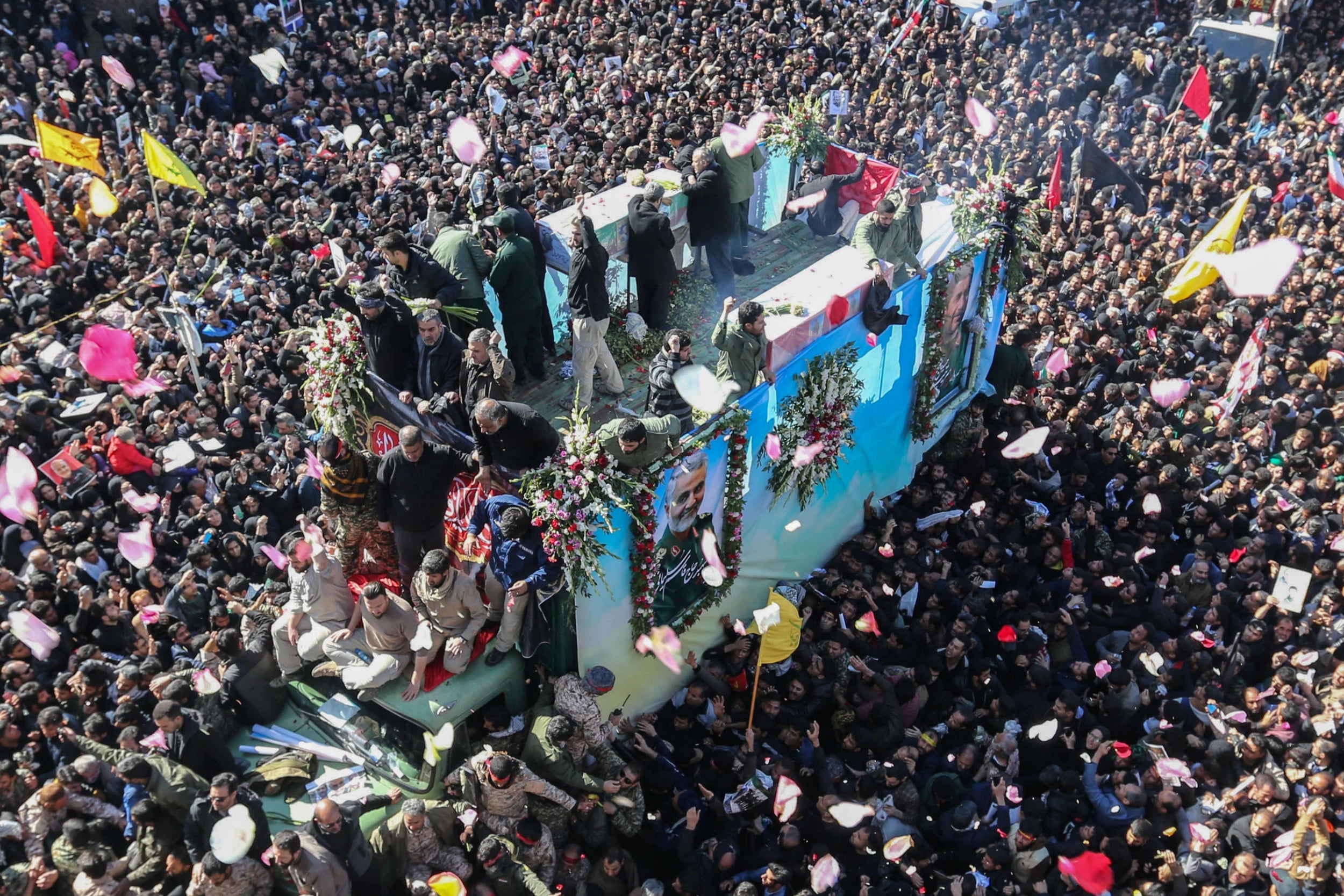
3/24 Kerman – Final stage of funeral processions
The assassination of the 62-year-old heightened international concern about a new war in the volatile, oil-rich Middle East and rattled financial markets
AFP via Getty
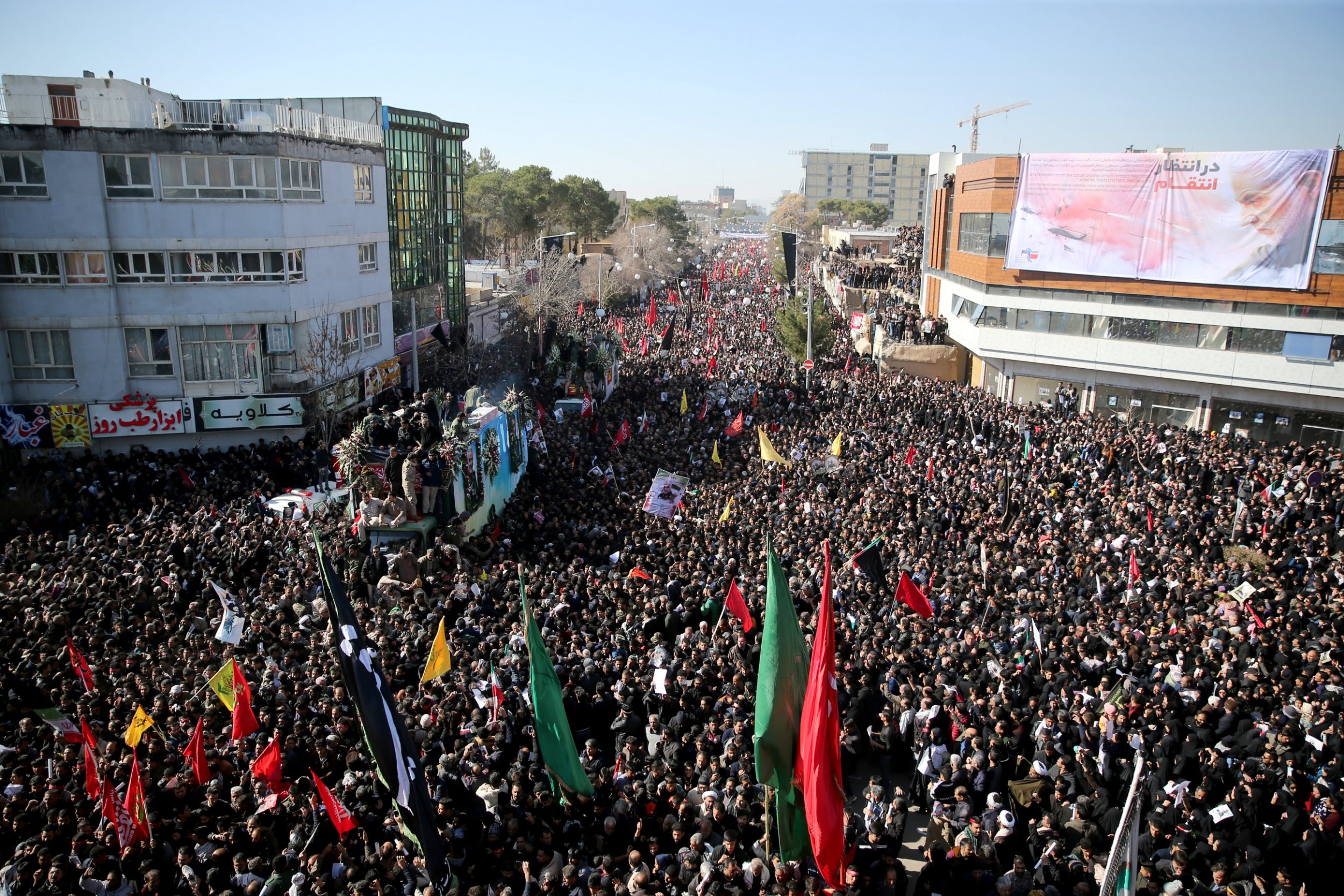
4/24 Kerman – Final stage of funeral processions
West Asia News Agency via Reuters
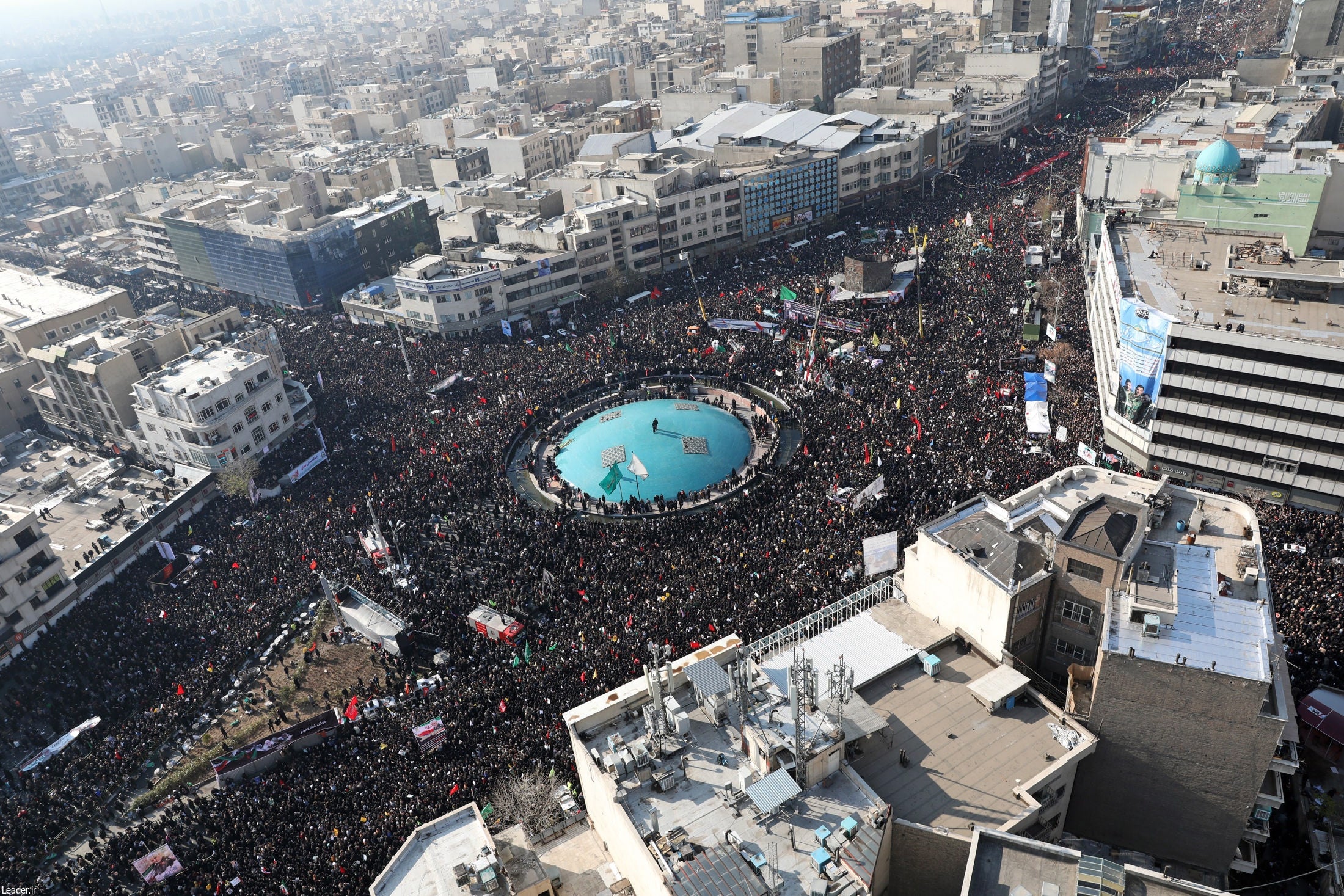
5/24 Tehran
Mourners packed the streets of Tehran for ceremonies to pay homage to Soleimani, who spearheaded Iran’s Middle East operations as commander of the Revolutionary Guards’ Quds Force and was killed in a US drone strike on January 3
Iranian Supreme Leader’s Office/EPA
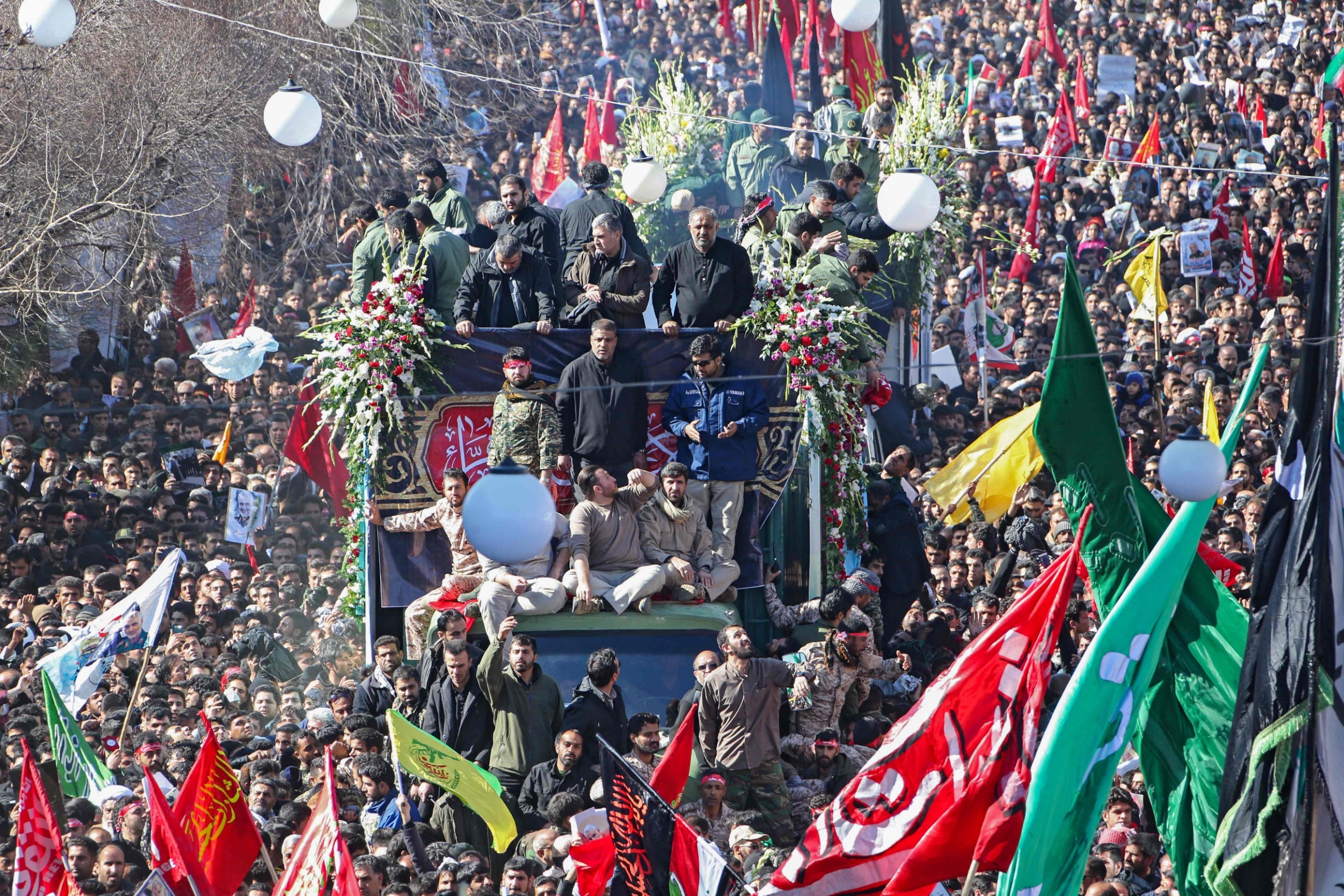
6/24 Kerman – Final stage of funeral processions
AFP via Getty Images
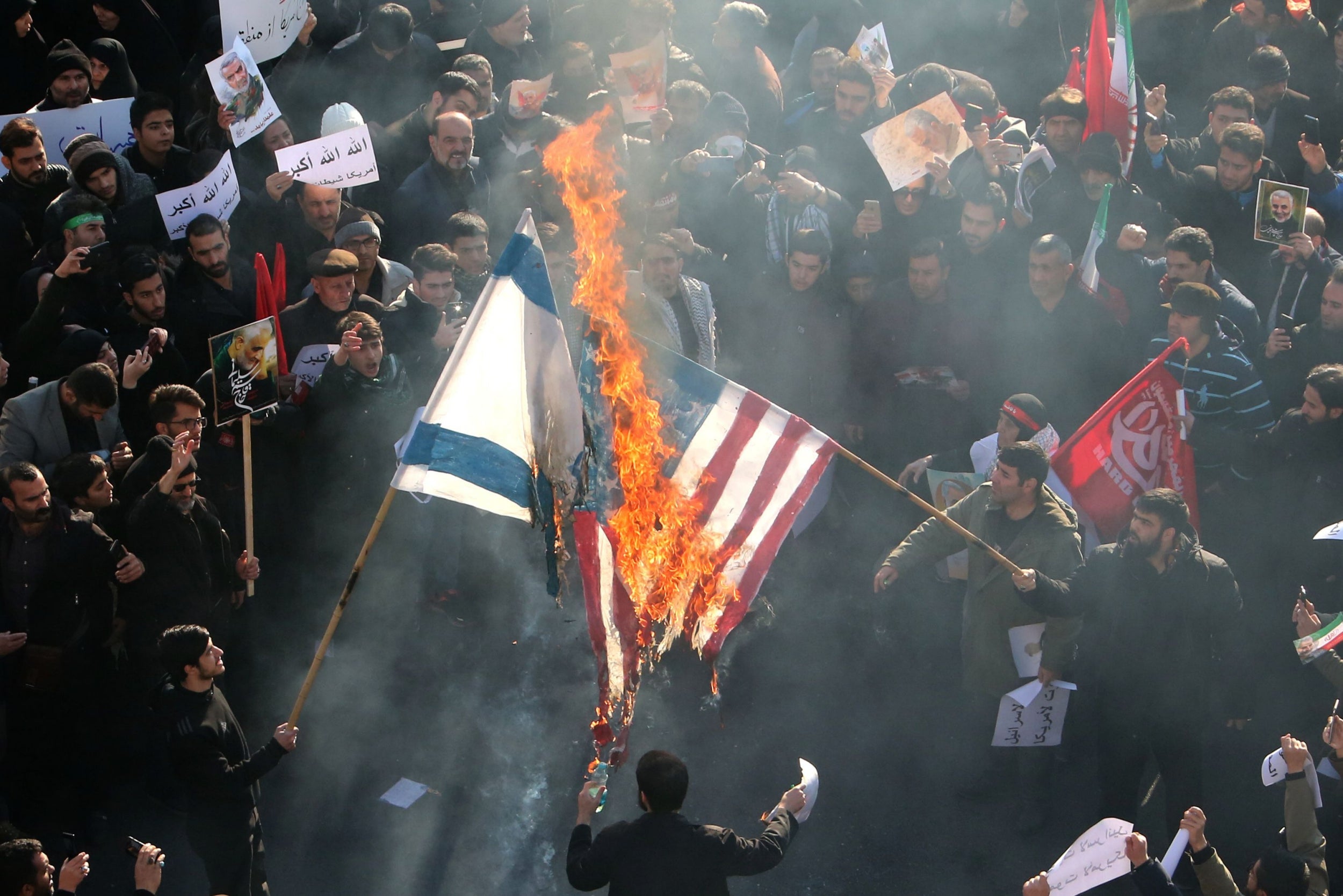
7/24 Tehran
Iranians set a US and an Israeli flag on fire during the funeral procession
AFP via Getty Images
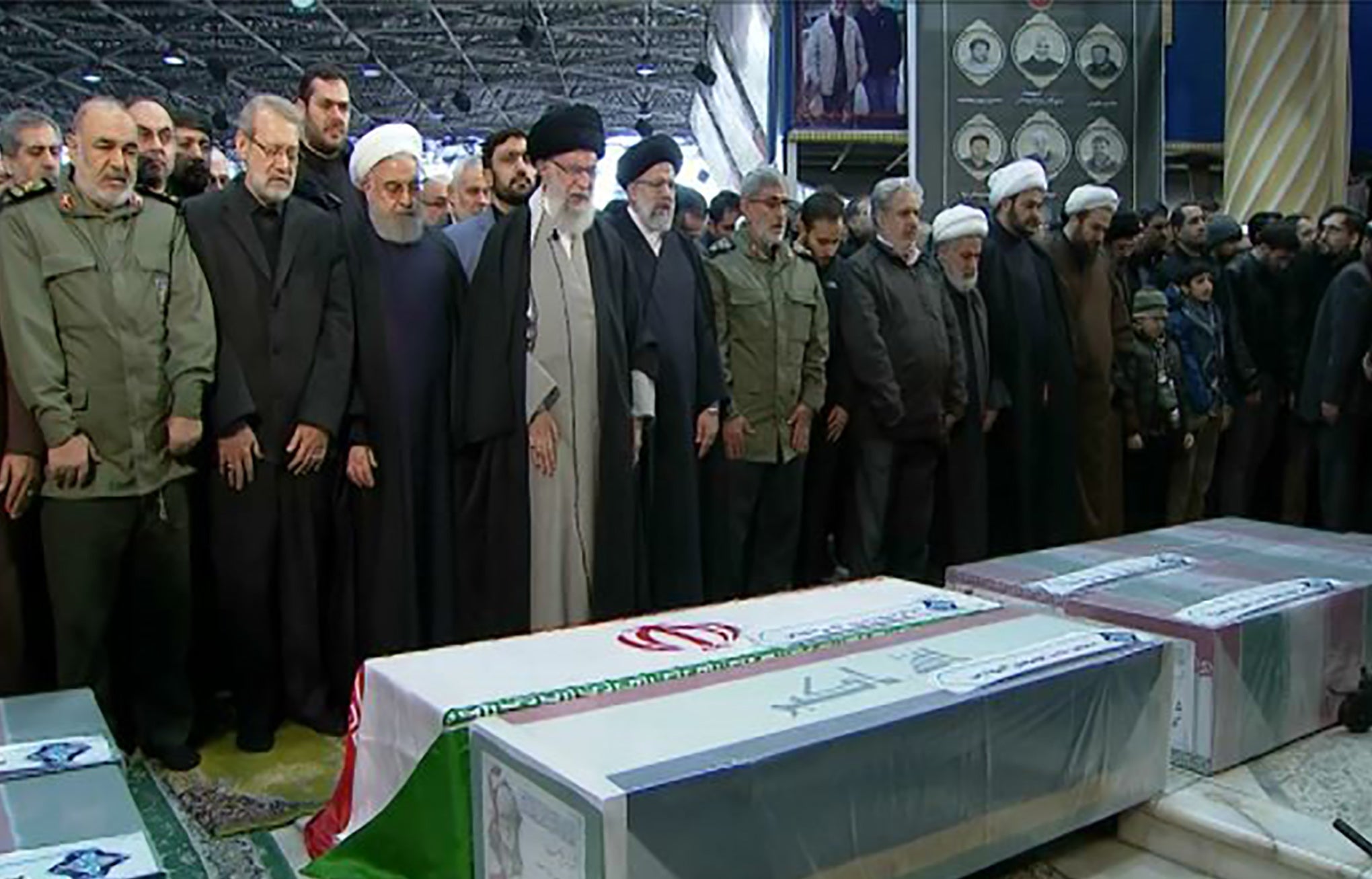
8/24 Tehran
Iran’s Supreme Leader Ayatollah Ali Khamenei, centre, with Parliament Speaker Ali Larijani, second left, and President Hassan Rouhani, third left, standing next to him as he leads a prayer over the caskets of Iranian military commander Qasem Soleimani and Iraqi paramilitary chief Abu Mahdi al-Muhandis at Tehran University
Khamenei.IR/AFP via Getty
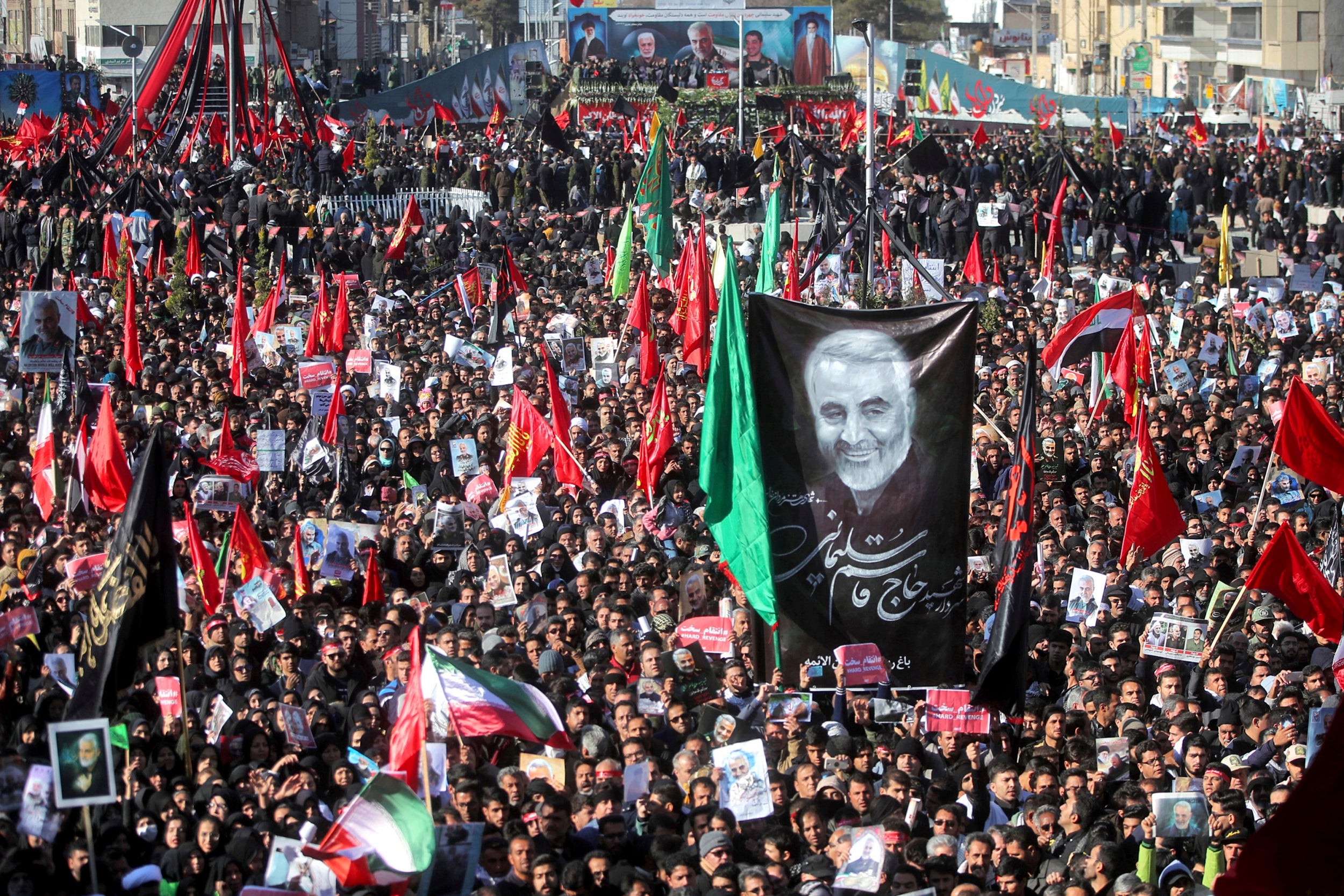
9/24 Kerman – Final stage of funeral processions
AP
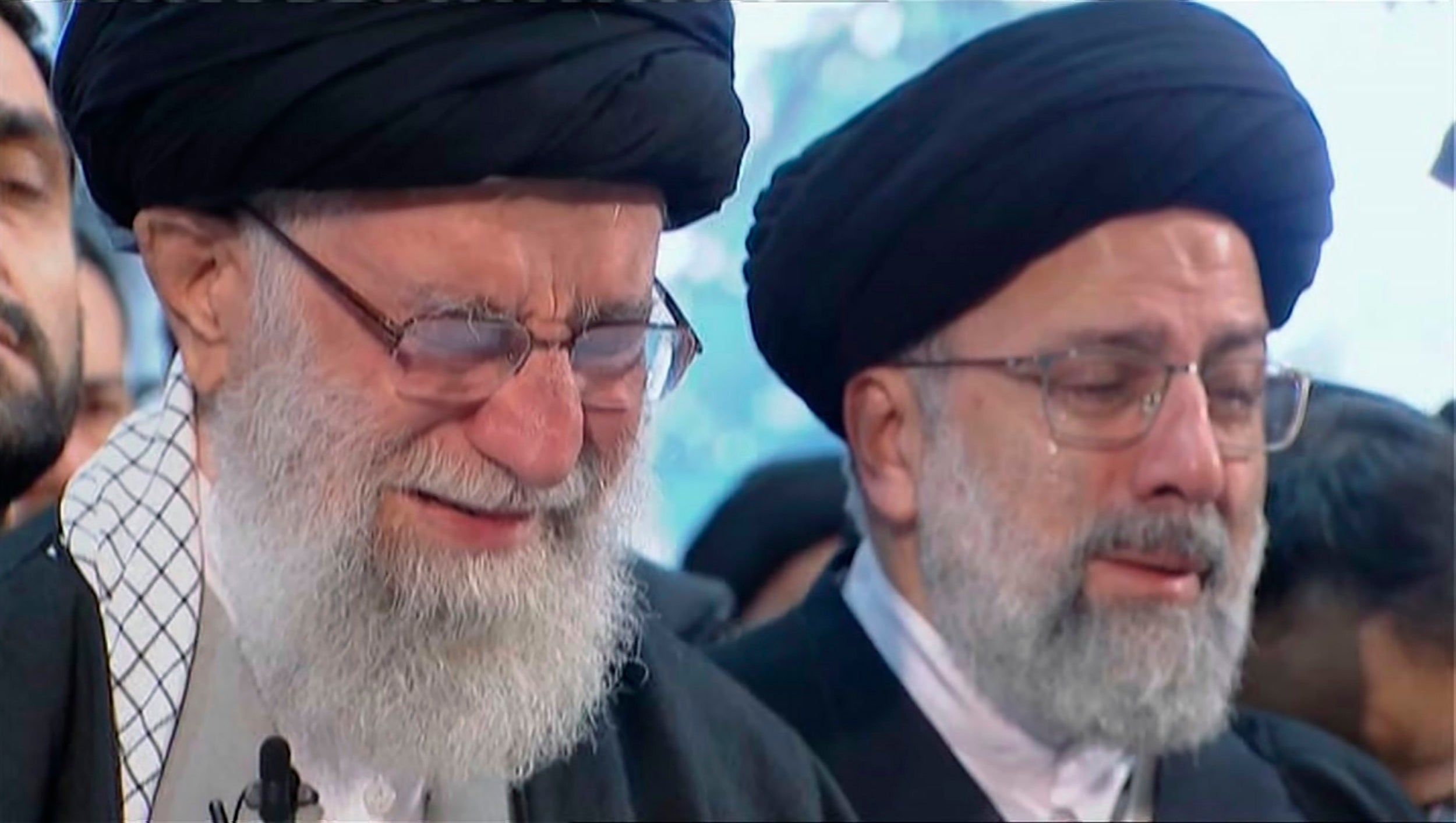
10/24 Tehran
Iranian Supreme Leader Ayatollah Ali Khamenei, left, openly weeps as he leads a prayer over the coffin of Qassem Soleimani
AP
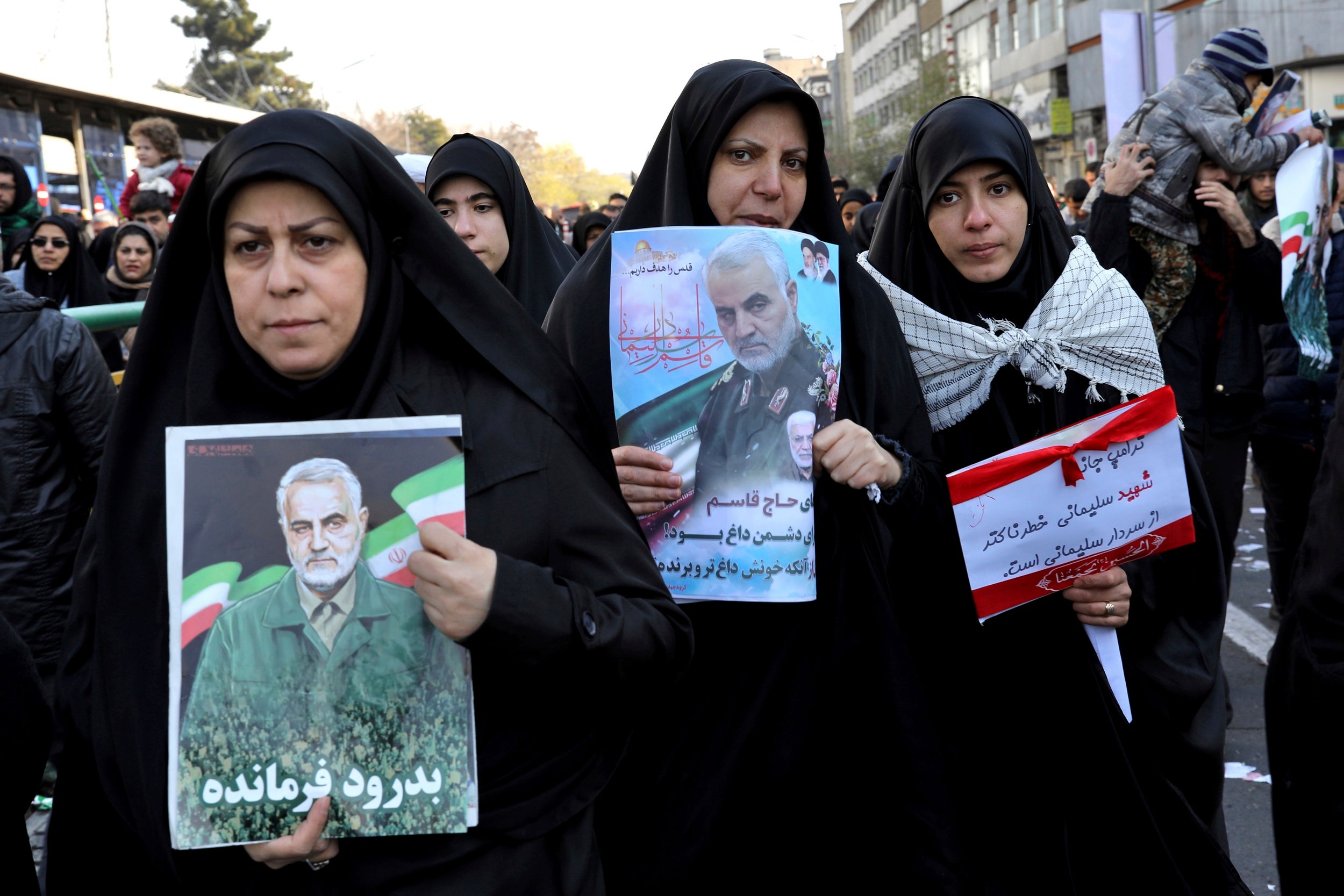
11/24 Tehran
Mourners holding posters of Qassem Soleimani
AP
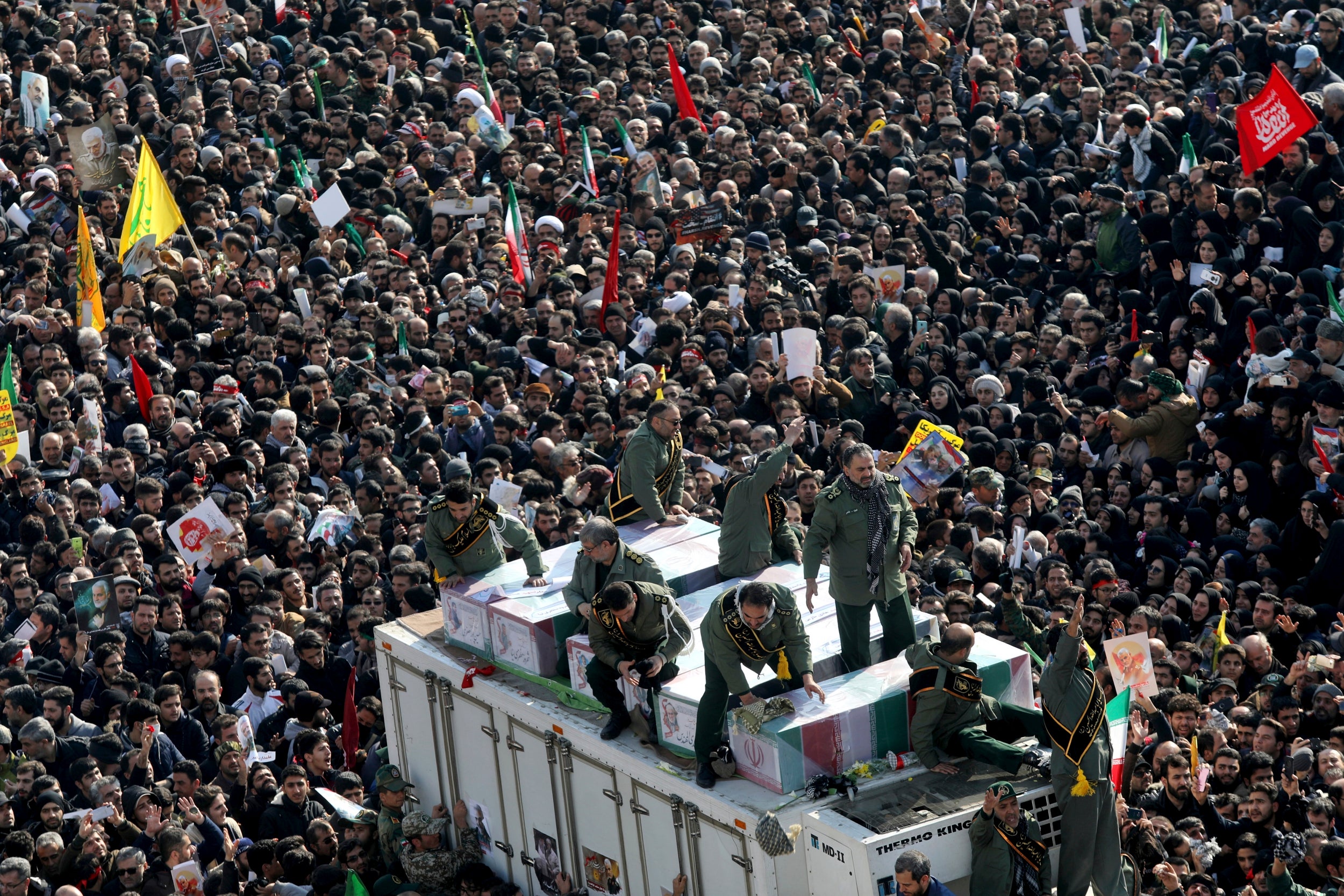
12/24 Tehran
Coffins of Soleimani and others who were killed in Iraq by a US drone strike, are carried on a truck surrounded by mourners during a funeral procession, at the Enqelab-e-Eslami (Islamic Revolution) square
AP
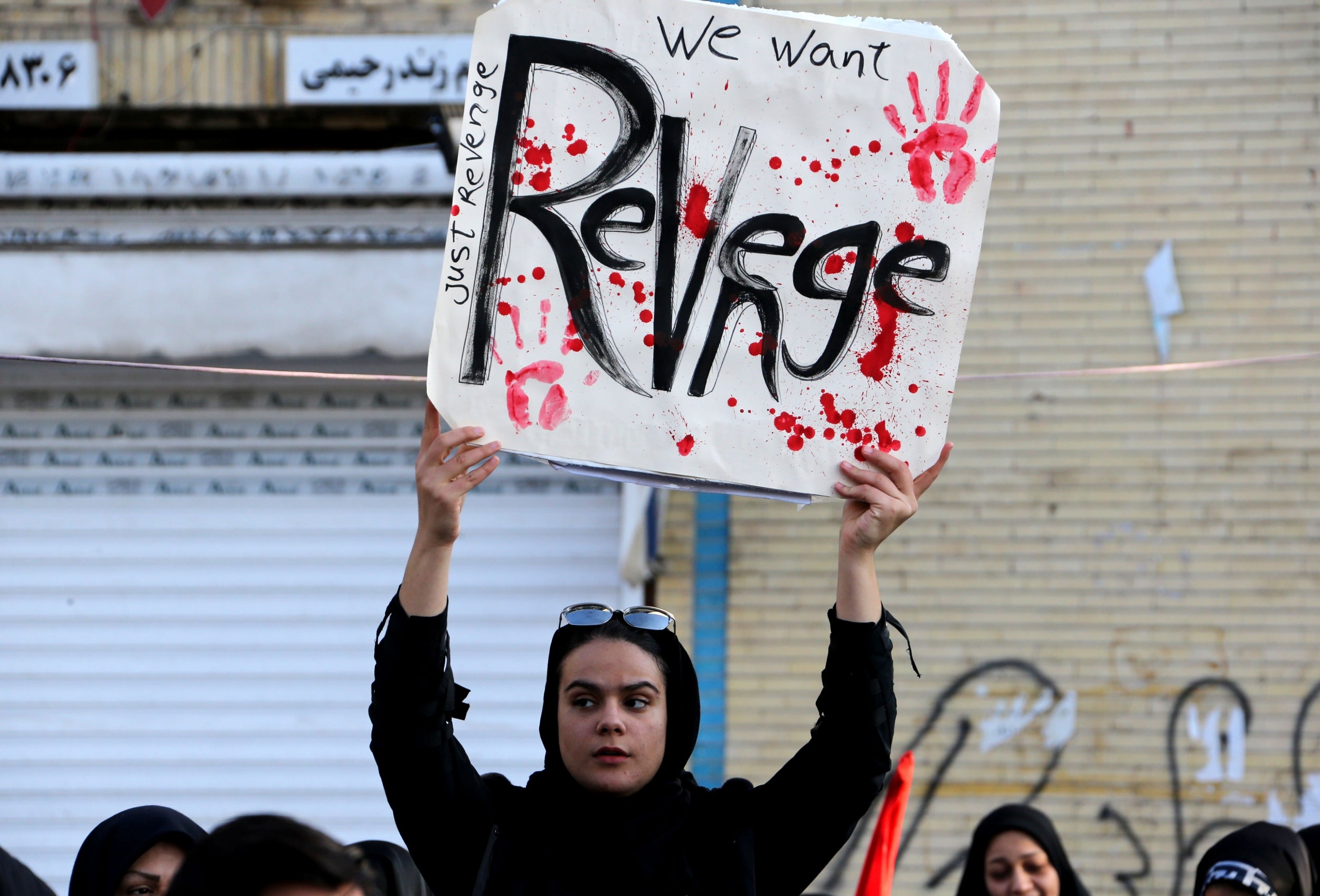
13/24 Kerman – Final stage of funeral processions
An Iranian mourner holds a placard
AFP via Getty Images
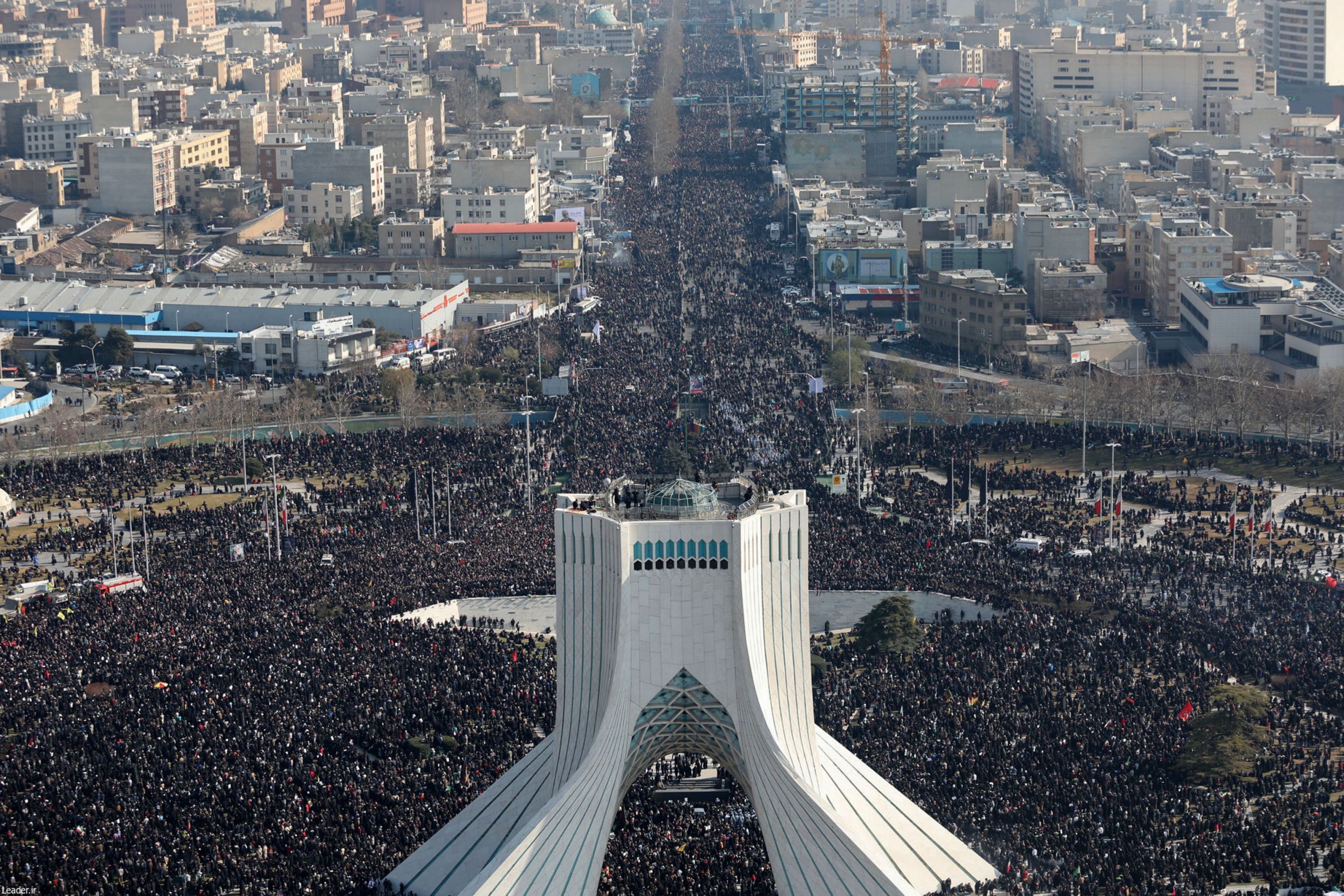
14/24 Tehran
Downtown Tehran was brought to a standstill as mourners flooded the Iranian capital
Khamenei.IR/AFP via Getty
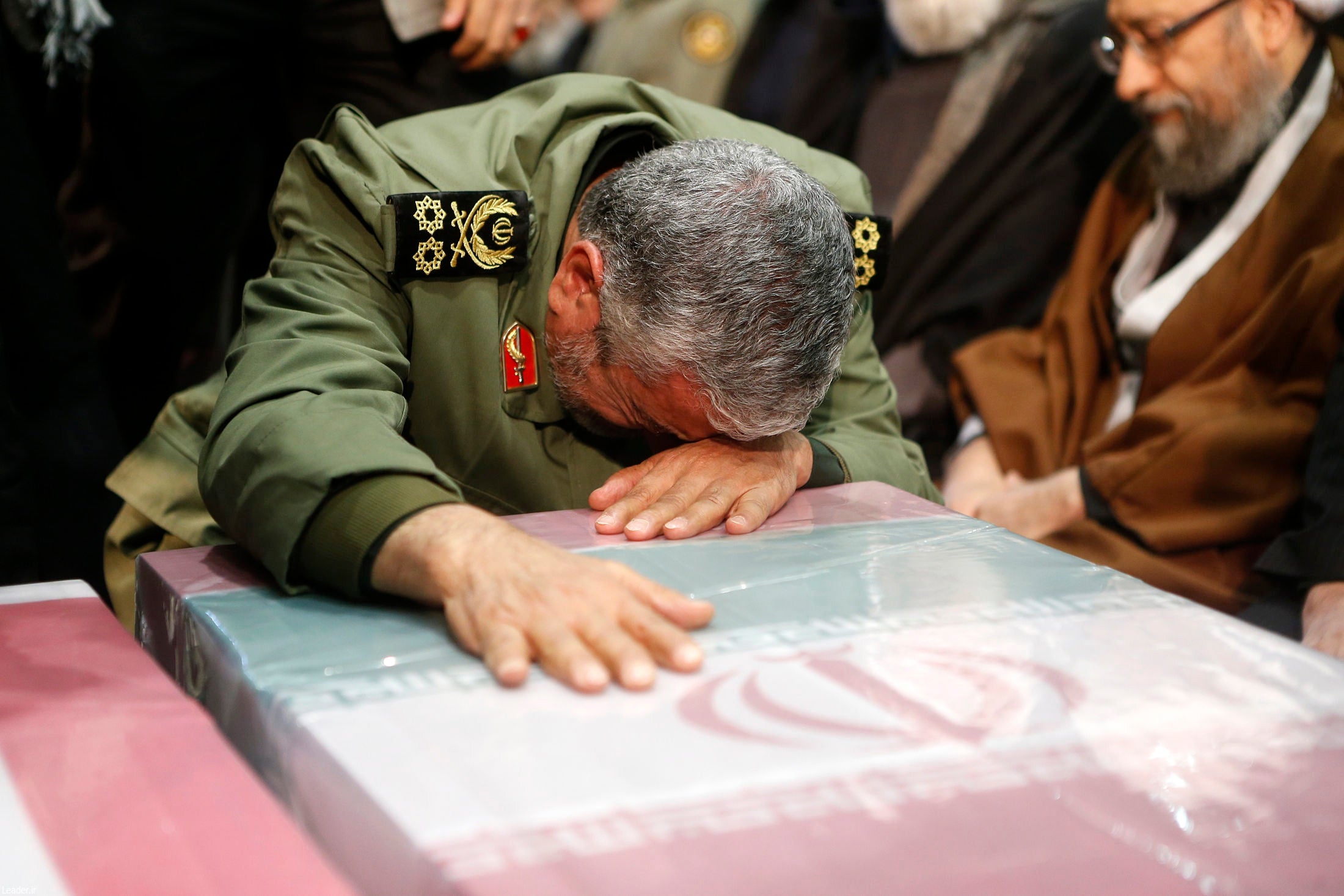
15/24 Tehran
Former Iranian Revolutionary Guards Corps chief Mohamad Ali Jafari prays on the coffins of Qasem Soleimani and of other victims during their funeral ceremony
EPA
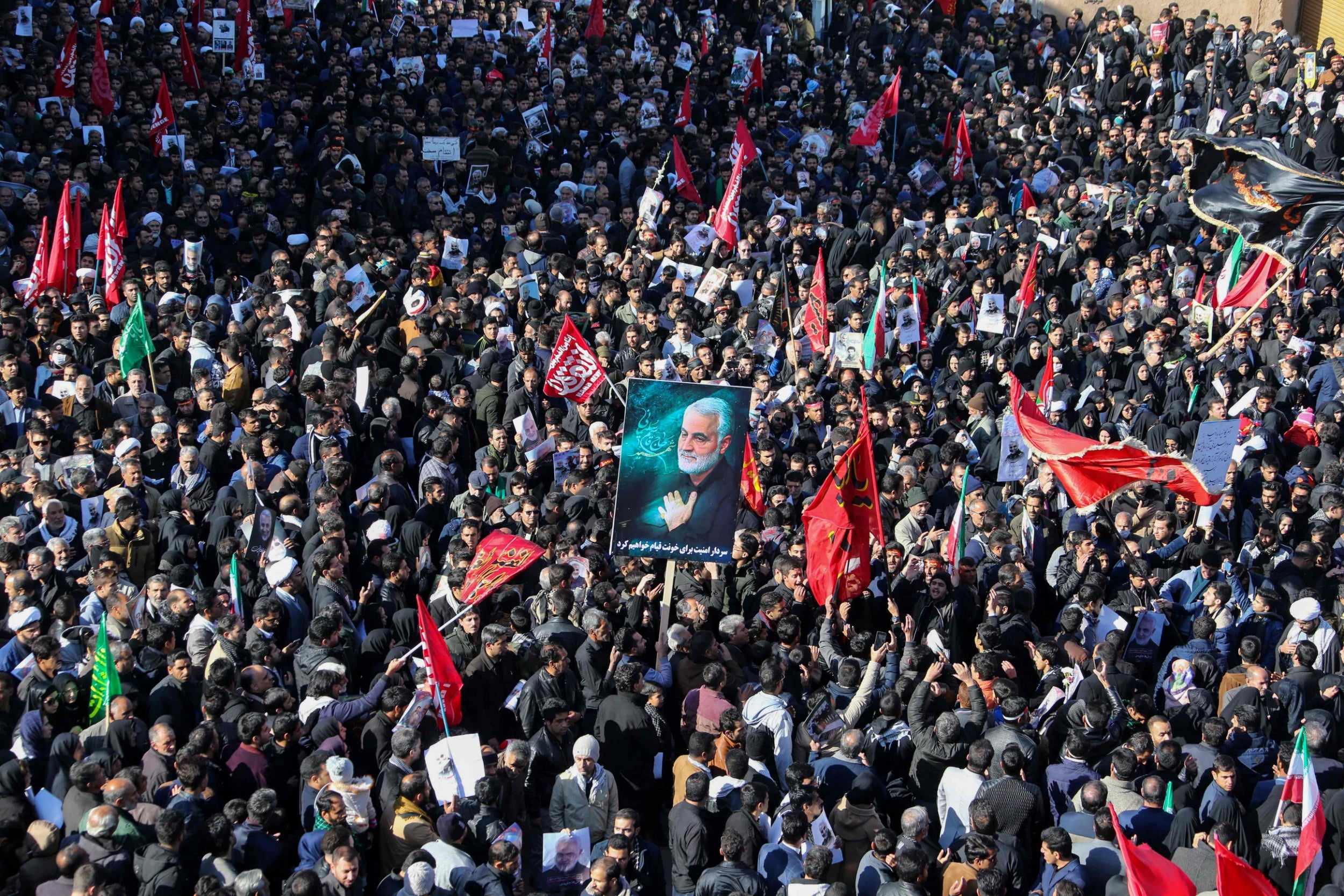
16/24 Kerman – Final stage of funeral processions
AFP via Getty Images
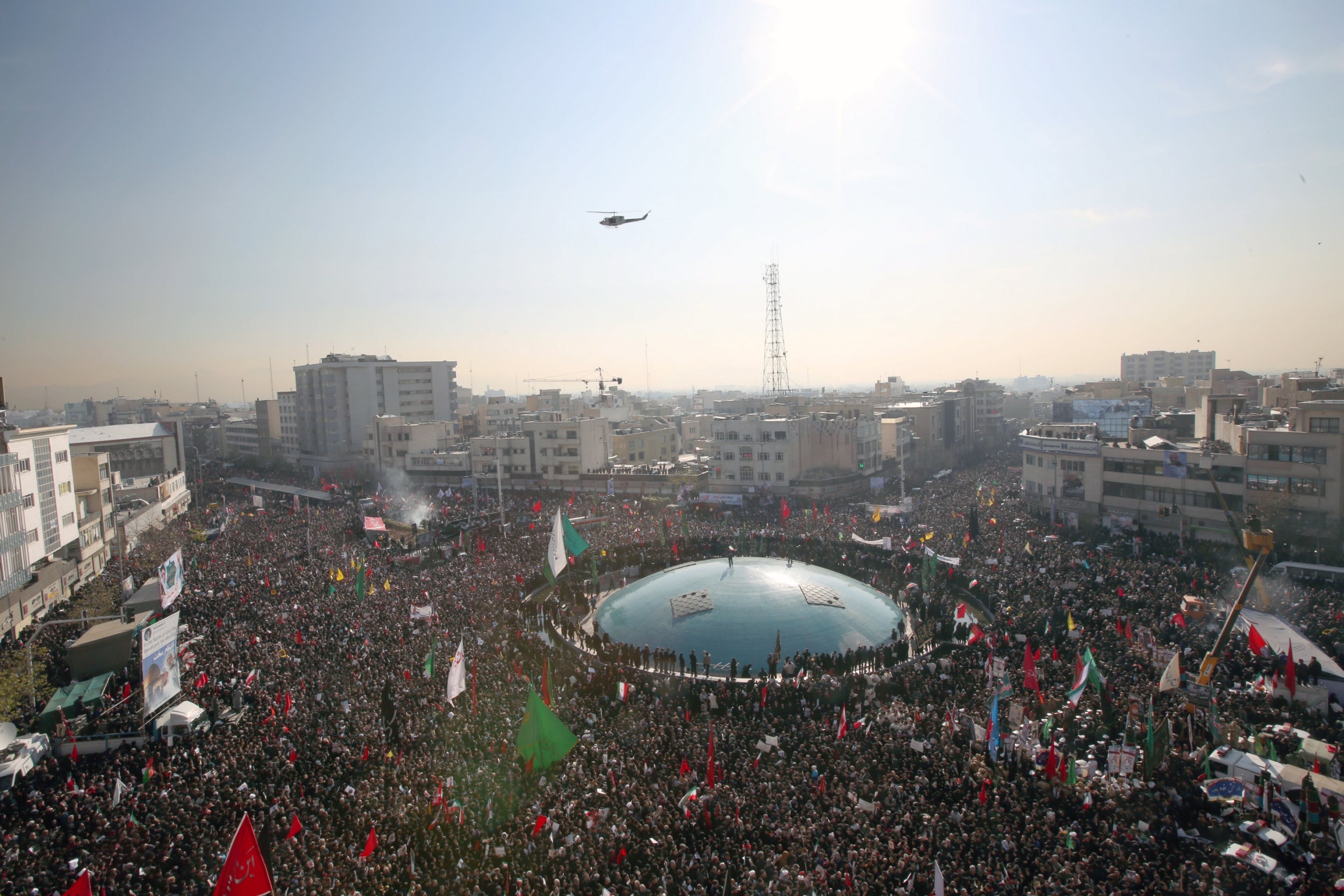
17/24 Tehran
EPA
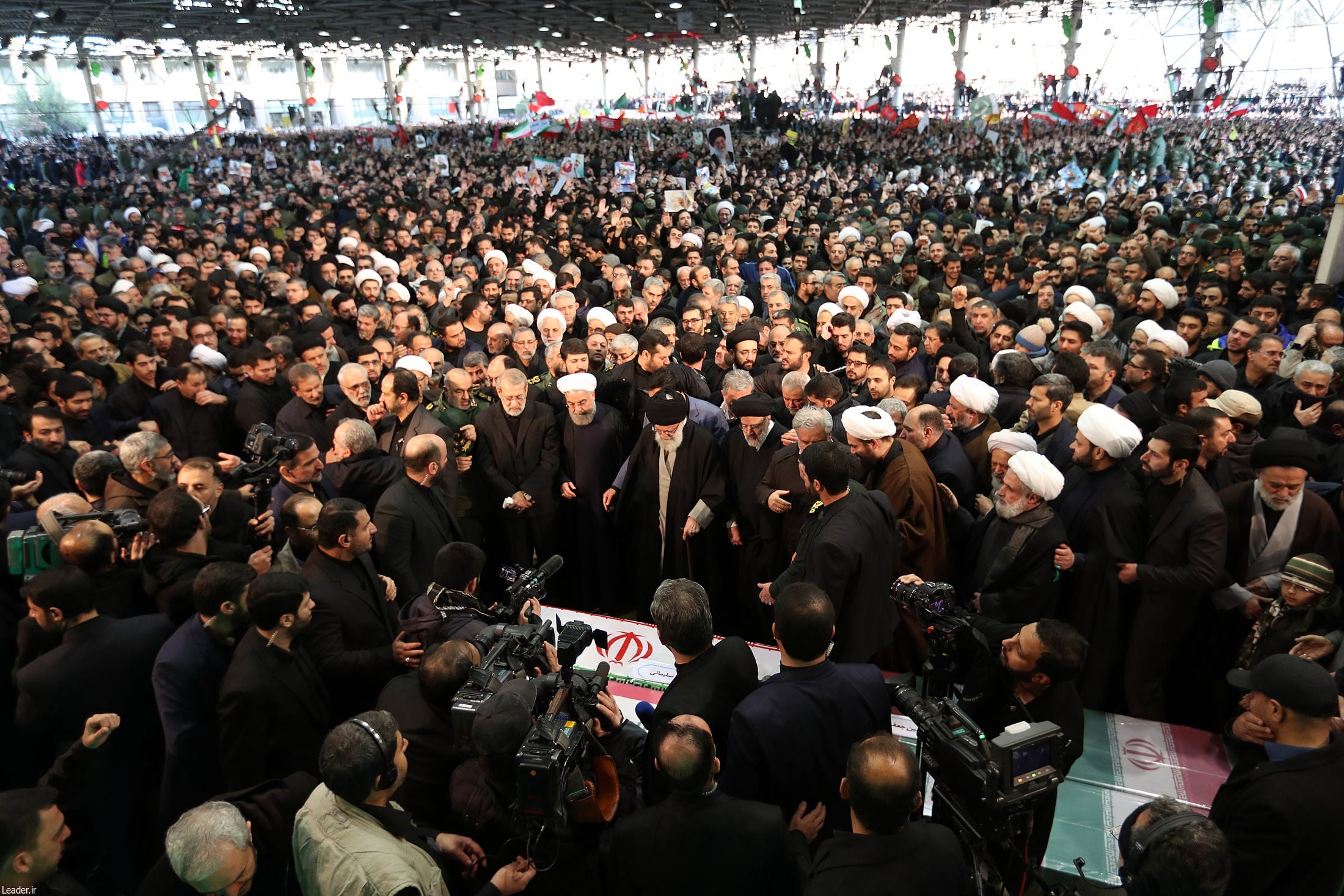
18/24 Tehran
EPA
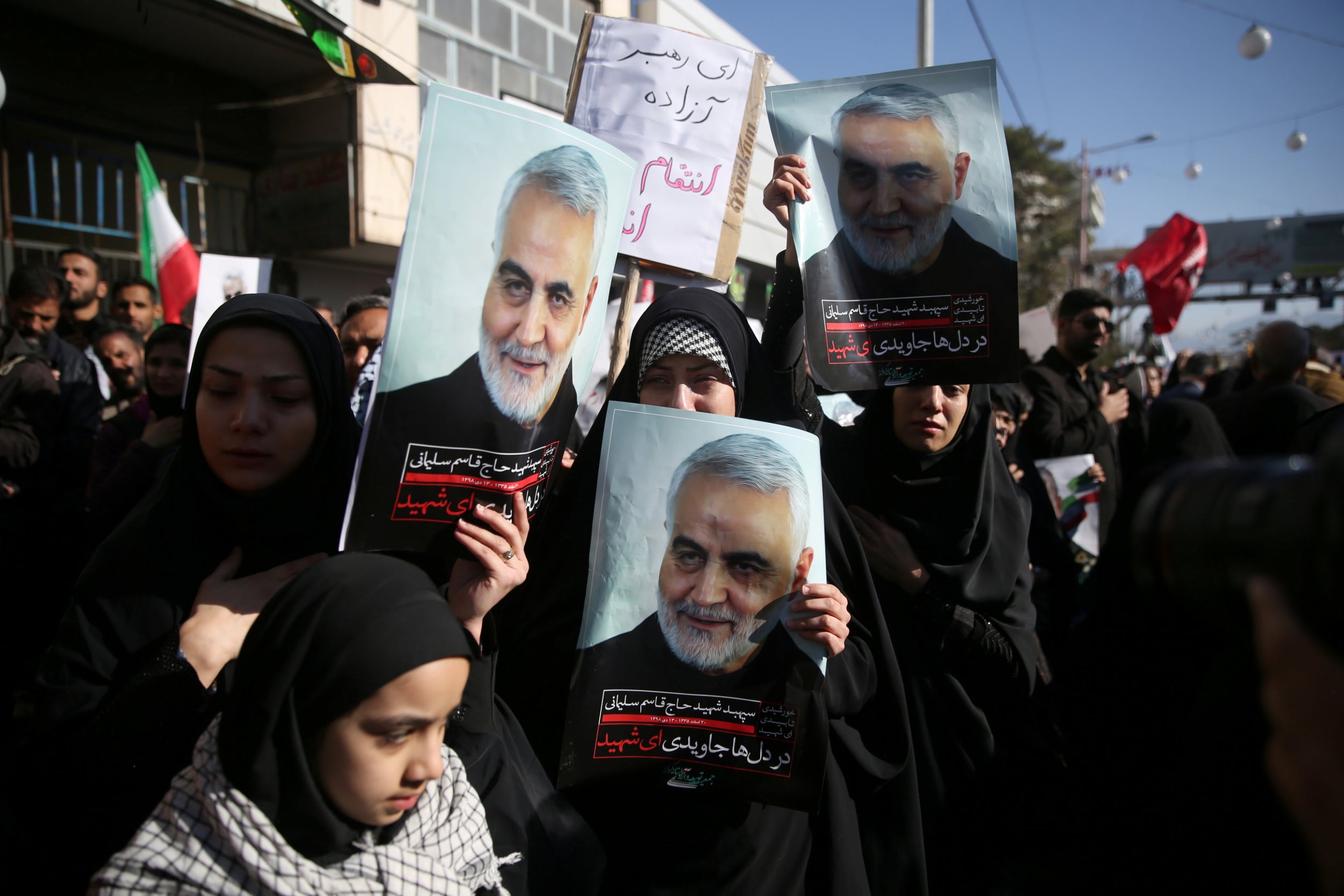
19/24 Kerman – Final stage of funeral processions
West Asia News Agency via Reuters
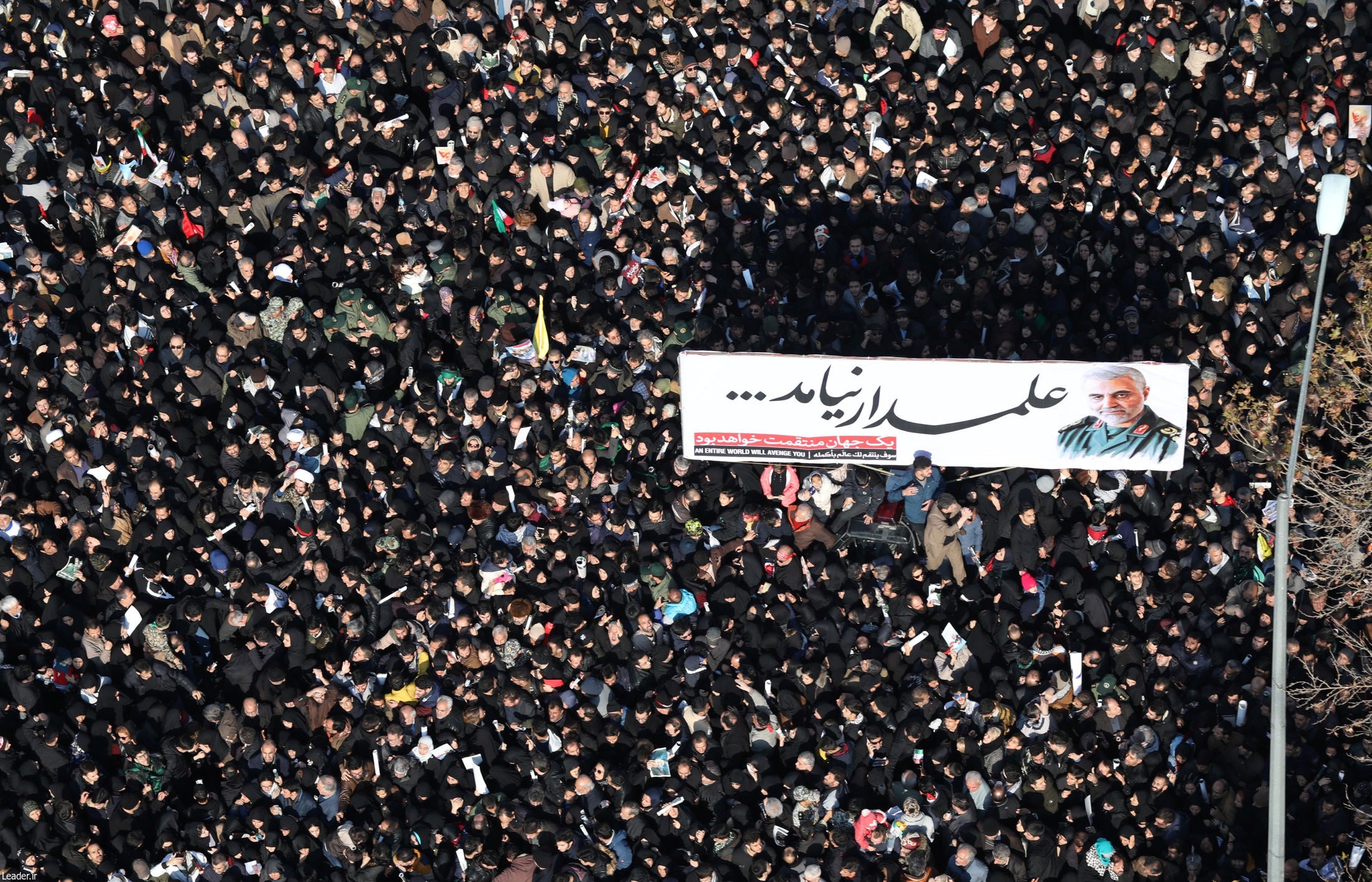
20/24 Tehran
Official Khamenei website via Reuters
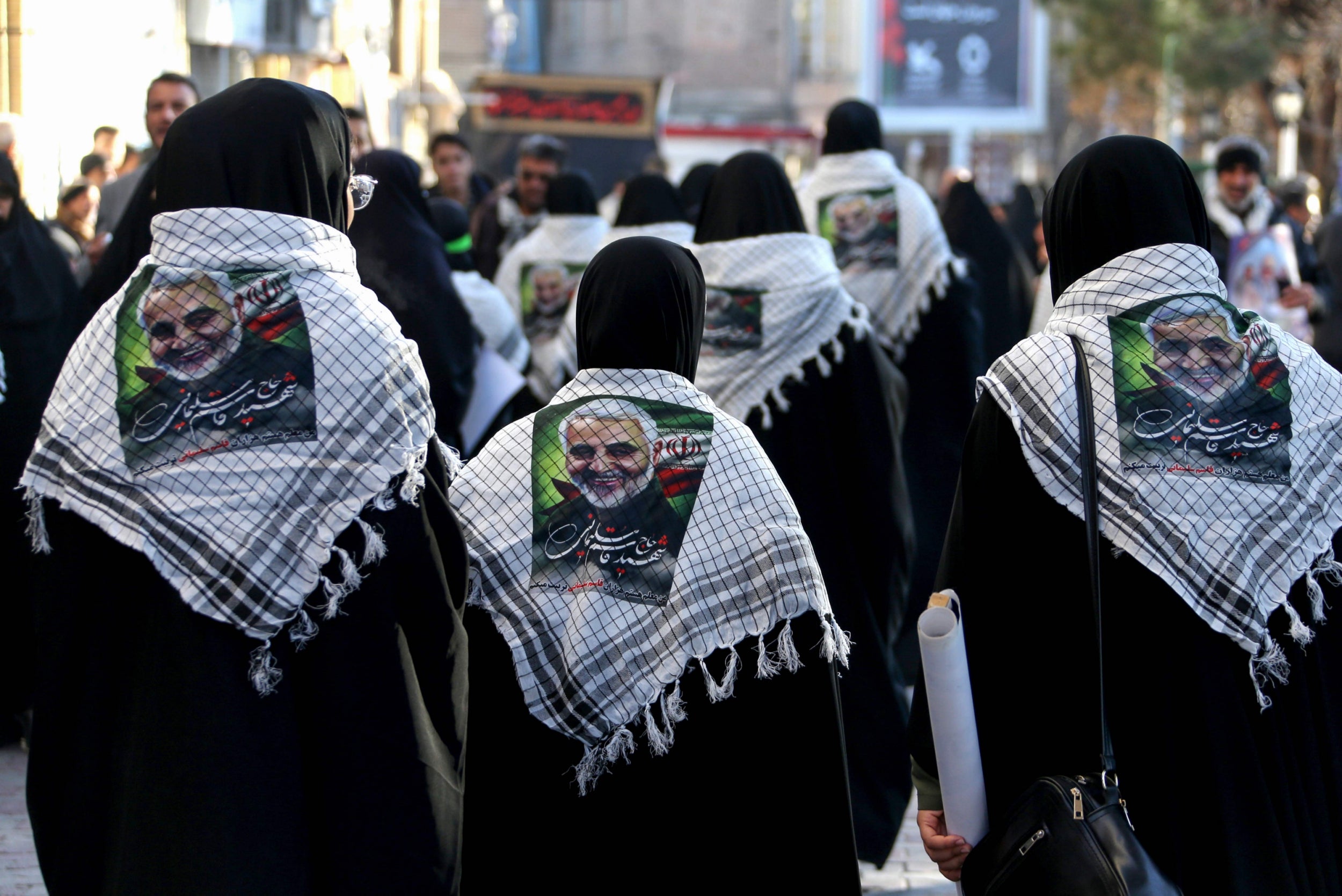
21/24 Kerman – Final stage of funeral processions
AFP via Getty Images
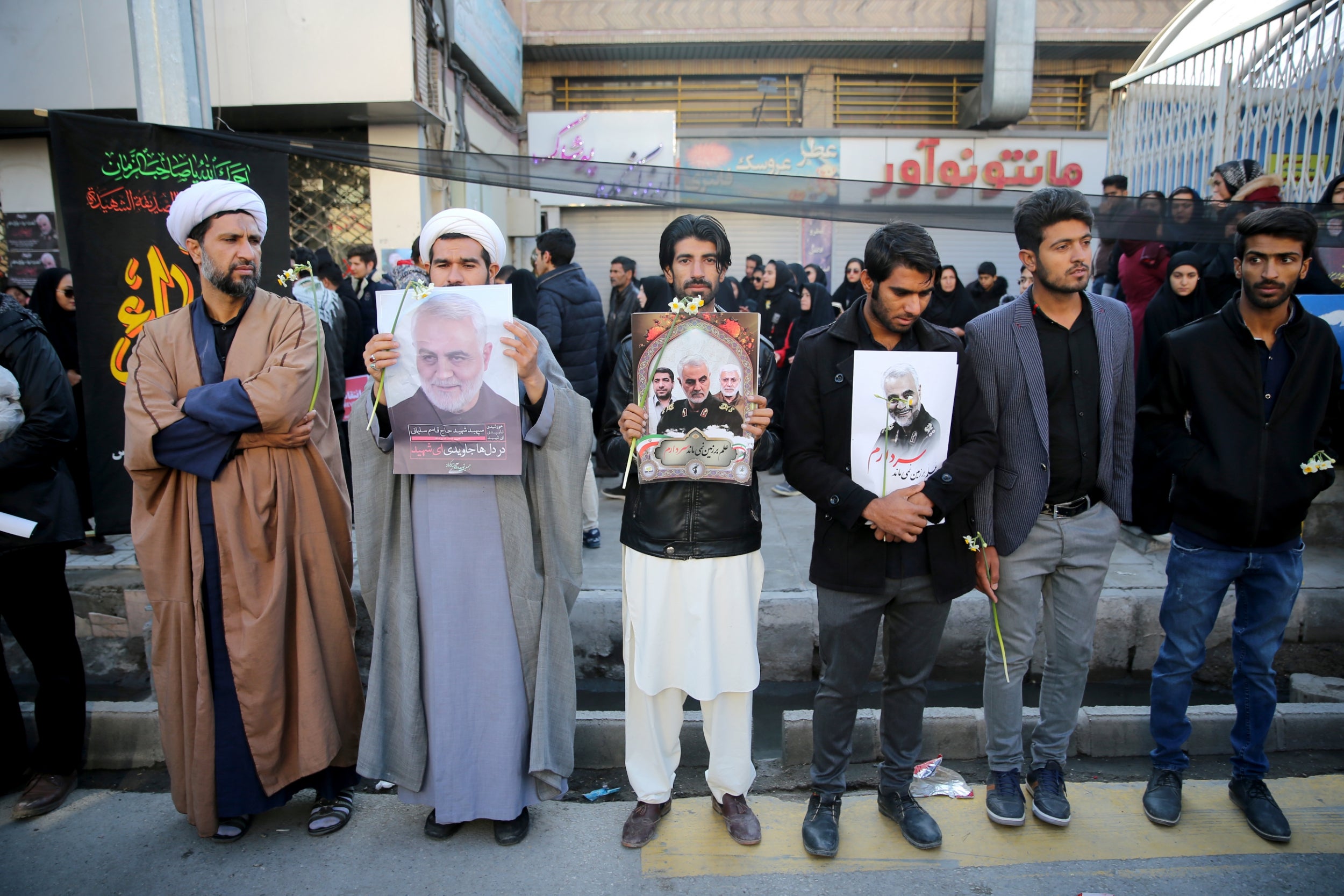
22/24 Kerman – Final stage of funeral processions
West Asia News Agency via Reuters
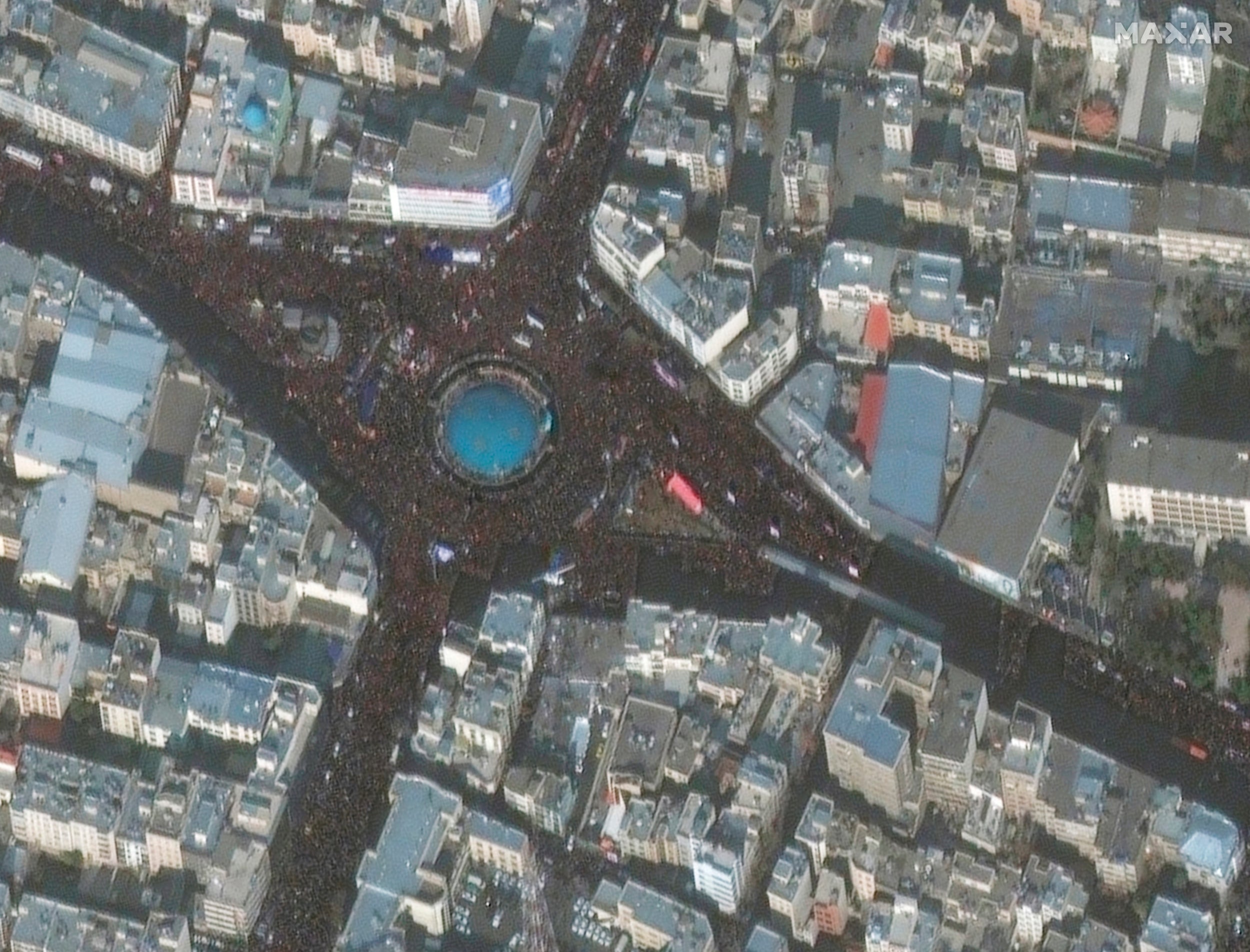
23/24 Tehran
Satellite image Maxar Technologies/AP
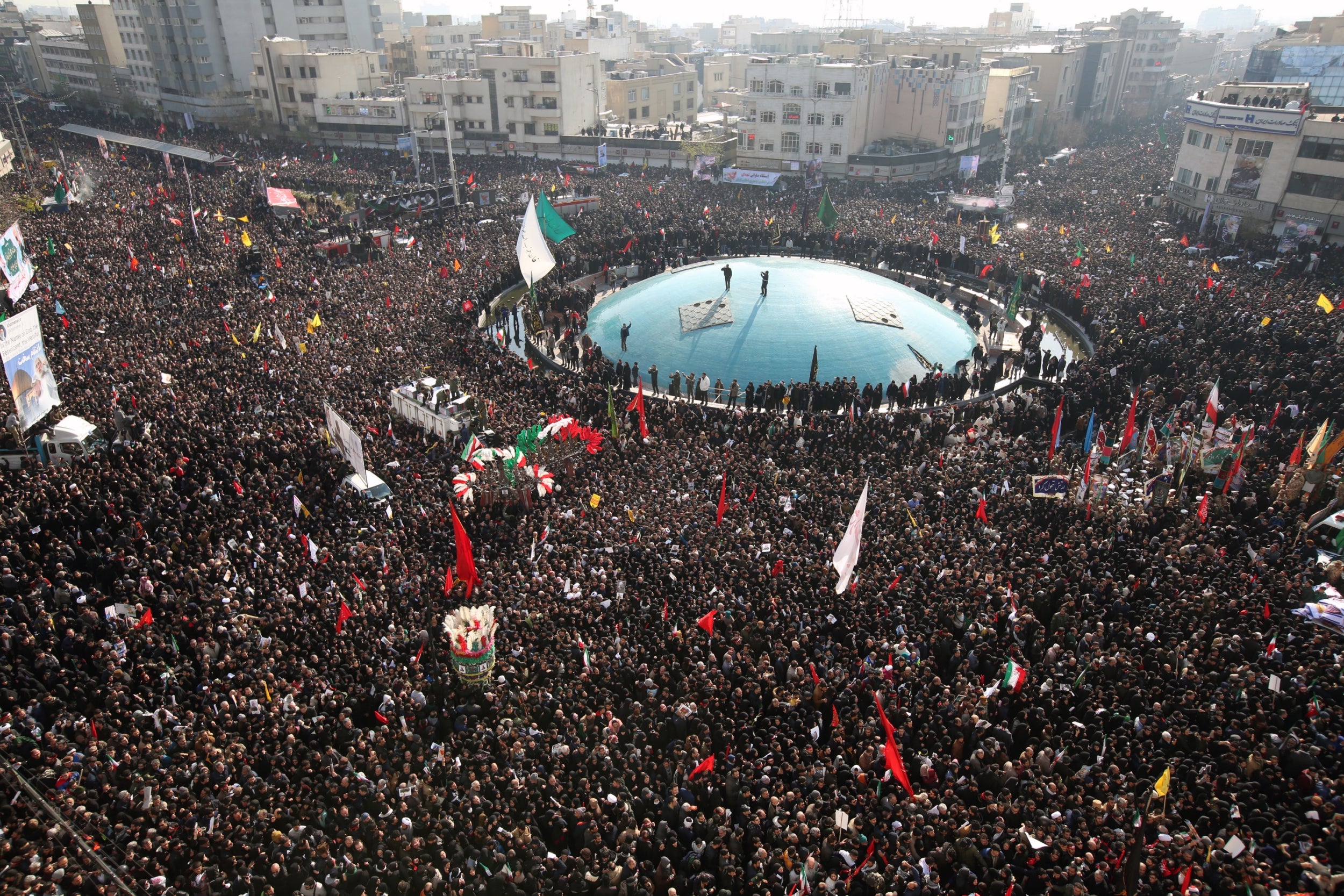
24/24 Tehran
EPA

1/24 Kerman – Final stage of funeral processions
Iranian mourners gather around a vehicle carrying the coffin of top general Qasem Soleimani during the final stage of funeral processions, in his hometown Kerman. Soleimani was killed outside Baghdad airport in a drone strike ordered by US President Donald Trump, ratcheting up tensions with Iran which has vowed “severe revenge”
AFP via Getty Images

2/24 Tehran
Iranian people carry a coffin of Iranian Major-General Qassem Soleimani during a funeral procession in Tehran
Official Khamenei website via Reuters

3/24 Kerman – Final stage of funeral processions
The assassination of the 62-year-old heightened international concern about a new war in the volatile, oil-rich Middle East and rattled financial markets
AFP via Getty

4/24 Kerman – Final stage of funeral processions
West Asia News Agency via Reuters

5/24 Tehran
Mourners packed the streets of Tehran for ceremonies to pay homage to Soleimani, who spearheaded Iran’s Middle East operations as commander of the Revolutionary Guards’ Quds Force and was killed in a US drone strike on January 3
Iranian Supreme Leader’s Office/EPA

6/24 Kerman – Final stage of funeral processions
AFP via Getty Images

7/24 Tehran
Iranians set a US and an Israeli flag on fire during the funeral procession
AFP via Getty Images

8/24 Tehran
Iran’s Supreme Leader Ayatollah Ali Khamenei, centre, with Parliament Speaker Ali Larijani, second left, and President Hassan Rouhani, third left, standing next to him as he leads a prayer over the caskets of Iranian military commander Qasem Soleimani and Iraqi paramilitary chief Abu Mahdi al-Muhandis at Tehran University
Khamenei.IR/AFP via Getty

9/24 Kerman – Final stage of funeral processions
AP

10/24 Tehran
Iranian Supreme Leader Ayatollah Ali Khamenei, left, openly weeps as he leads a prayer over the coffin of Qassem Soleimani
AP

11/24 Tehran
Mourners holding posters of Qassem Soleimani
AP

12/24 Tehran
Coffins of Soleimani and others who were killed in Iraq by a US drone strike, are carried on a truck surrounded by mourners during a funeral procession, at the Enqelab-e-Eslami (Islamic Revolution) square
AP

13/24 Kerman – Final stage of funeral processions
An Iranian mourner holds a placard
AFP via Getty Images

14/24 Tehran
Downtown Tehran was brought to a standstill as mourners flooded the Iranian capital
Khamenei.IR/AFP via Getty

15/24 Tehran
Former Iranian Revolutionary Guards Corps chief Mohamad Ali Jafari prays on the coffins of Qasem Soleimani and of other victims during their funeral ceremony
EPA

16/24 Kerman – Final stage of funeral processions
AFP via Getty Images

17/24 Tehran
EPA

18/24 Tehran
EPA

19/24 Kerman – Final stage of funeral processions
West Asia News Agency via Reuters

20/24 Tehran
Official Khamenei website via Reuters

21/24 Kerman – Final stage of funeral processions
AFP via Getty Images

22/24 Kerman – Final stage of funeral processions
West Asia News Agency via Reuters

23/24 Tehran
Satellite image Maxar Technologies/AP

24/24 Tehran
EPA
In a public address to the American people on Wednesday morning, Mr Trump explained that there have been no casualties from the attack and he is going to respond to Iran with more sanctions and not further military action.
After a long night of fearing an imminent war breaking out between the two countries, many in Iran, Iraq, and across the region will breathe a sigh of relief. But the proxy war between the world’s superpower and the region’s power has not ended. And conflict may ensue again soon unless a major shift happens in the long-term policy.
“The fundamentals of the trajectory of the conflict between the US and Iran have not changed,” said Joel Rubin, former deputy assistant Secretary of State in the Obama administration, adding that: “We are still on a tinderbox and the Trump administration’s goals are neither clear nor is there a plan for how to achieve them beyond the current maximum pressure campaign.
“We need a different path to avoid having this repetitive conversation about whether or not we are going to war. Because right now that’s the path we continue to be on. One has to question the real objectives of President Trump’s policy because if it’s about reining in Iran’s regional behaviour and nuclear ambition, it is not achieving those results,” Mr Rubin told The Independent.
In his statement, Donald Trump called on other parties of the Iran nuclear deal – UK, France, Germany, Russia, and China – to break away and get on board with him trying to negotiate a new deal with Iran. But right now there doesn’t seem to be any chance for serious diplomacy between Tehran and Washington, unless a breakthrough happens after the dust settles.



